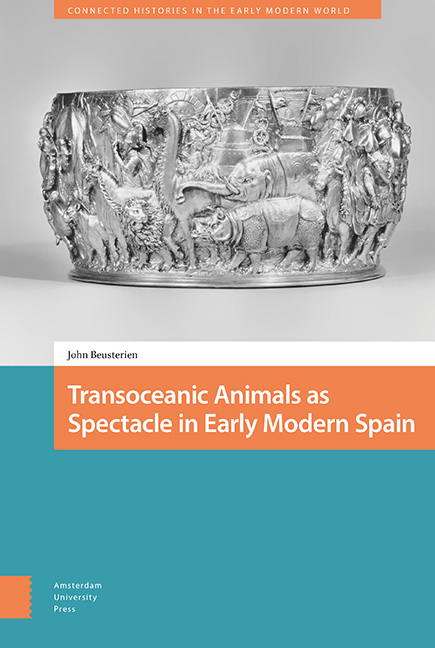Book contents
- Frontmatter
- Dedication
- Contents
- List of Illustrations
- Prologue
- Introduction: Armored Beasts and the Elephant in the Room
- 1 Hawa’i the Elephant and Abada the Rhinoceros
- 2 Fuleco the Armadillo
- 3 Jarama the Bull and Maghreb the Lion
- Conclusion: Biogeography as a Teaching Tool
- Appendix 1 Biogeography Course Project: Naming an Early Modern Animal
- Appendix 2 Bibliography for the Study of Animals and Early Modern Spain
- Index
3 - Jarama the Bull and Maghreb the Lion
Published online by Cambridge University Press: 21 November 2020
- Frontmatter
- Dedication
- Contents
- List of Illustrations
- Prologue
- Introduction: Armored Beasts and the Elephant in the Room
- 1 Hawa’i the Elephant and Abada the Rhinoceros
- 2 Fuleco the Armadillo
- 3 Jarama the Bull and Maghreb the Lion
- Conclusion: Biogeography as a Teaching Tool
- Appendix 1 Biogeography Course Project: Naming an Early Modern Animal
- Appendix 2 Bibliography for the Study of Animals and Early Modern Spain
- Index
Summary
Abstract
Chapter 3 provides a biogeography of Maghreb the lion and Jarama the bull. The collection of poems in The Amphitheater of Philip the Great describes a day of animal spectacle, focusing on the staged combat between Jarama and Maghreb. The poems celebrate the bull as classical hero and Philip IV as imperial hunter. After Jarama killed Maghreb, the poets in the collection depict the fighting bull as Spain's own species and as the only wild animal in the world that was still to be dominated. They describe Philip IV's final execution of the bull before the public as the spectacle's glorious climax. The group of poets in The Amphitheater of Philip the Great represent the imperial literary elite who sought to forge collective identities of Europe and Spain, as well as in terms of race.
Keywords: history of the bullfight, staged animal combats, Maghreb the lion (ca. 1621–1631), Jarama the bull (ca. 1626–31), Philip IV of Spain (1605–65), Anfiteatro de Felipe el Grande (The Amphitheater of Philip the Great, 1632)
Performance practice should never make animals the exclusive object of the human gaze. Instead, sites of animal performance need to be ones of bodily experimentation in which animals and humans are simultaneously both performers and audience members. Human singers, for instance, listen to whales and then alter their song and, at the same time, whales listen to the humans and alter theirs.
In an essay in Performing Animality: Animals in Performance Practices (2015), Laura Cull Ó Maoilearca points to the possibility of spontaneous, emotive, and transformational mutual human-animal interaction. Interspecies collaboration as a performance model helps humans develop strategies for solving future environmental problems by becoming sensitive to nonhuman animals as companions, who, even before humans existed, adapted to the arrival of other living organisms and environmental disruption.
As in the last two chapters, the first half of the following chapter examines the lives of its two protagonists: Jarama, the bull, born on the banks of a river about thirty-six miles south of Madrid with other bulls bred for fighting, and Maghreb, the lion, born in a cave in the Atlas Mountains in northern Africa.
- Type
- Chapter
- Information
- Transoceanic Animals as Spectacle in Early Modern Spain , pp. 173 - 222Publisher: Amsterdam University PressPrint publication year: 2020



